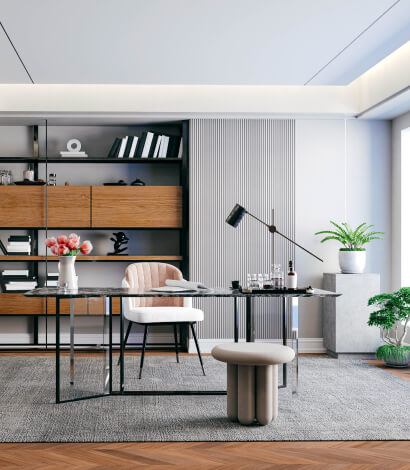Designing a modern living space is about more than aesthetics—it’s about creating environments that reflect personality, enhance functionality, and adapt to the way we live today. Whether you’re designing a smart home, a minimalist condo, or a multifunctional open-plan loft, one of the biggest challenges remains the same: how to translate a vision into reality with confidence and precision.
Enter the powerful fusion of interior design and Virtual Reality (VR) walkthroughs. Together, they are revolutionizing how homeowners and designers conceptualize, refine, and execute design ideas—turning imagination into immersive experience long before construction begins.
The Evolution of Modern Living Spaces
Modern living isn’t just about clean lines and smart technology—it’s about creating flexible, livable environments tailored to real life. Today’s homes must be:
Efficiently laid out, making the most of every square foot
Visually cohesive, with consistent materials and palettes
Highly personalized, reflecting the owner’s lifestyle and values
Technologically integrated, with seamless smart home features
The design process needs to keep pace. That’s where the partnership between professional interior design and virtual reality becomes essential.
From Idea to Immersion: The Role of Interior Design
Great interior design transforms empty rooms into meaningful spaces. A professional designer doesn’t just decorate—they analyze how you live, how the space functions, and what story it should tell. With their expertise in materials, color theory, lighting, and spatial planning, they turn vague concepts into clear design strategies.
But even the best designs can fall flat if clients can’t fully visualize the outcome.
That’s where VR technology comes in—not as a replacement for design, but as a next-level enhancement to it.
What Is a VR Walkthrough?
A Virtual Reality walkthrough is a digital simulation of your interior design plan. It lets you experience your space in full scale before it’s built or renovated. Using VR headsets, desktops, or tablets, you can:
Walk through rooms in real-time
Look around, up, and down in 360 degrees
See how furniture, materials, and lighting work together
Test how natural light moves through your home at different times
Interact with features like doors, smart devices, or lighting systems
VR takes your design out of theory and into tangible reality—making it easier to fine-tune and perfect.
How the Process Works
Here’s a breakdown of how modern living spaces are designed today using the powerful combo of interior design and VR:
🔹 Step 1: Concept Development
It starts with discovery. The designer learns about your goals, style preferences, lifestyle needs, and the architectural constraints of your space.
🔹 Step 2: 3D Design Creation
A detailed 3D model of your space is developed using architectural software. Everything from layout and furniture to color schemes and finishes is included.
🔹 Step 3: Virtual Reality Integration
The 3D model is rendered into an immersive VR experience. Whether you’re using a headset or a screen, you can step inside the design and walk around.
🔹 Step 4: Review & Refine
You and your designer review the space together—adjusting layouts, experimenting with finishes, testing lighting, and solving problems before a single hammer swings.
🔹 Step 5: Final Approval & Execution
Once you’re completely satisfied with what you’ve seen in VR, the design is finalized for construction or renovation.
Why VR Is a Game-Changer for Modern Interiors
✅ True-to-Scale Understanding
No more guessing how large a room will feel or if your furniture will fit. VR gives you a real-world perspective of every detail.
✅ Smarter Decision-Making
See how a matte black faucet looks with a marble vanity. Test multiple configurations. VR lets you compare and choose with confidence.
✅ Fewer Surprises, Fewer Regrets
You can catch potential design flaws—like a blocked view or an awkward layout—before they become expensive construction issues.
✅ Faster Approvals and Feedback
Clients can explore the design on their own time and provide faster, more informed feedback.
✅ Enhanced Personalization
Because you can interact with your space in VR, you’ll naturally find better ways to align the design with your habits, routines, and taste.
Use Cases for VR in Modern Living Spaces
🏡 Smart Homes
Design how your smart lighting, thermostats, and home assistants are integrated—visually and functionally—in real time.
🛋️ Multifunctional Rooms
Try different configurations for rooms that serve dual purposes, like a home office that doubles as a guest bedroom.
🪟 Open-Plan Layouts
Visualize how sightlines, furniture zones, and lighting will work in open-plan kitchens and living rooms.
🧒 Family-Friendly Designs
Explore storage solutions, safety features, and flexible spaces for kids—so you know the layout supports your daily life.
VR Walkthroughs: Not Just for New Builds
While VR is often associated with new construction, it’s equally transformative for:
Renovations and remodels
Furniture layout planning
Color and material comparisons
Interior upgrades in existing homes
Even small design decisions become clearer when you can experience them virtually.
The Future Is Now
As interior design continues to evolve, VR is becoming less of a luxury and more of a standard practice—especially for clients who want more control and clarity in the design process. It empowers homeowners to take an active role in shaping their environments with fewer compromises and more satisfaction.
Final Thoughts
Modern living demands modern solutions. Interior design paired with VR walkthroughs offers a transformative approach to creating spaces that truly reflect who you are and how you live. It’s not just about what looks good on paper—it’s about experiencing your space before it exists, solving problems early, and building with certainty.
From concept to reality, this approach redefines what’s possible in home design—and ensures that your dream space isn’t just imagined, but fully realized.
Ready to walk through your next design?
Partner with a designer who offers VR walkthroughs and turn your modern living space from vision to virtual to real.


